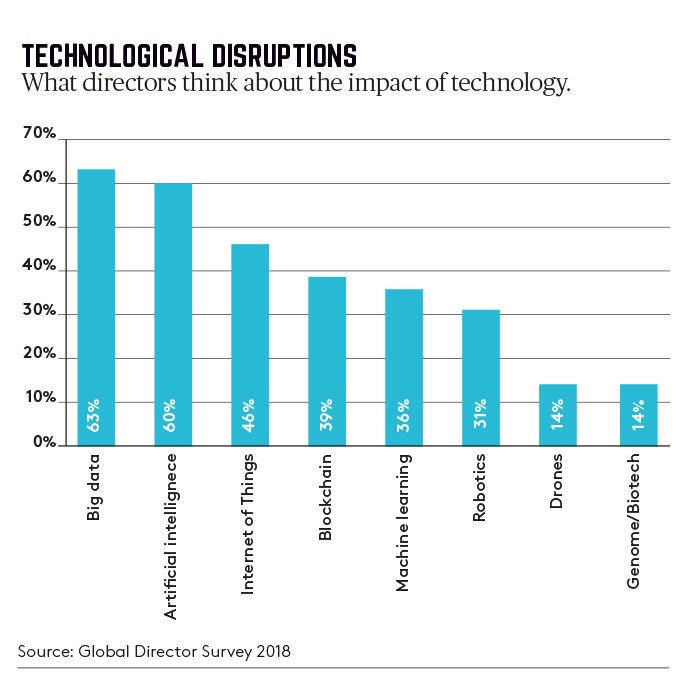A global overview of director sentiment on everything from big data, environmental issues to taxation and board recruitment.
The Global Network of Director Institutes (GNDI) inaugural Global Director Survey 2018 took the pulse of more than 2000 directors from 17 member organisations — representing Africa-Middle East, the Americas, Asia-Pacific and Europe — aiming to get insights across a range of economic, business and governance issues.
The survey found that 45 per cent of global directors were mostly confident or very confident about business and the prospects for growth in 2019. Europe had the most confident directors at 59 per cent, while business confidence was lower in Africa-Middle East at 44 per cent.
Big data and data privacy: benefits
Big data top-scored for technological disruptors in all regions, with 63 per cent of directors expecting their organisations to be impacted in the next two years. Big data has been a hot topic of conversation among directors, highlighted by the recent introduction of mandatory data breach reporting laws in various countries.
However, the survey showed that currently only 28 per cent of boards use big data in decision-making. An understanding of big data, along with technological disruptors such as the Internet of Things (IoT), blockchain and artificial intelligence (AI), ensures boards are able to develop a coherent data strategy that can effectively mine endless amounts of information. Data privacy and security form critical components of strategies like these — which 37 per cent of directors reported having limited or no understanding of.
GNDI chair Angela Cherrington notes that boards have a key leadership and oversight role in data governance. “For a board to ask management the right questions and hold management to account, they need to understand and address data privacy and cybersecurity issues as they arise,” she says.

Board recruitment and diversity: how to get there
Fifty-nine per cent of directors viewed skills as very important in their latest board recruitment, coming in just behind background and experience at 62 per cent. While boards look for a broad range of skills and experiences when recruiting, the figures around diversity left room for concern. Only 51 per cent of directors viewed gender diversity as important, fairly important or very important.
Diversity and inclusion in organisations ranked sixth of relevant environmental, economic and social issues that affect organisations’ strategies and activities — behind ethical behaviour, community engagement and employee health and safety.
Edward Palmisano MAICD, the AICD’s head of International, regularly discusses diversity with directors around the world — from Dubai to Hong Kong to Fiji.
“When discussing diversity we see different responses, from high levels of diversity in places like Norway due to legislated quotas, to deeper cultural barriers that limit diversity in other countries,” he says.
Social and environmental issues: part of business
Ethical behaviour (72 per cent), health and safety (65 per cent) and employee engagement (57 per cent) were the three most relevant environmental and social issues and risks among surveyed directors. However, the report revealed many environmental issues and risks were not prioritised, including climate change (57 per cent), carbon-related issues (67 per cent), resource scarcity (56 per cent) and depletion of fossil fuels (70 per cent).
Cherrington says these issues speak to the long-term sustainability of organisations and should be part of a board’s strategy when considering alternative future scenarios. “The environment, climate change, carbon-related issues and resource management will become more important, and part of the conversation for more countries as the Paris Accord and United Nations Sustainable Development Goals get more attention.”
Latest news
Already a member?
Login to view this content


